TeachableMedicalNews article 10132019
Teachable moment in classrooms:
- urinary system chapter – glucose reabsorption from filtrate
- urinary system chapter – filtration by small blood vessels in glomerulus
- endocrine system chapter – insulin and insulin receptor in type 2 diabetes
Can peeing out blood sugar possibly save us from kidney failure?
The news item: Recent news reports wrote about the unexpected health benefit of the type 2 diabetes drug, Invokana.
https://www.seattletimes.com/business/study-finds-diabetes-drug-may-prevent-slow-kidney-disease/
The article mentions that deaths from kidney failure, the need for dialysis, the need of kidney transplant were reduced by 30% in treated patients.
So, Why Do I Care?? Kidney failure makes it impossible to get rid of waste products from our blood. This disorder can kill us. There are about 27 million people in the USA have type 2 diabetes. About 7 million of those patients will develop some form of kidney failure. Overall treatment cost was estimated to be $25 billion in 2017. The most severe case of kidney disease causes about 70,000 deaths every year. That 30% reduction by Invokana means saving more than 20,000 lives yearly in the USA.
Plain English, Please!!! First, let’s talk about Invokana. This drug treats type 2 diabetes which is caused by too high blood sugar. They way Invokana lowers blood sugar is mindboggling. Invokana instructs the kidneys to allow surplus blood sugar to go into the final urine, so we literally pee out the surplus blood sugar. So, what’s happening here? Our kidneys are programmed to reclaim all sugar from the forming urine, so the sugar (glucose by its chemical name) doesn’t end up in the final urine we pee out. The cells in our kidneys reclaim glucose by opening doors for the glucose molecules to move out of the urine. Invokana forces those doors to be shut, and so, surplus glucose will stay in the final urine, and patients treated with Invokana indeed pee it out.
Second, let’s talk about why lowering blood sugar can help patients with kidney disease. Surplus blood sugar that you see in many diabetic patients can damage the blood vessels of the kidneys, and waste products are no longer removed from our blood. When Invokana allows some of that surplus glucose to leave our bodies, then less glucose will be in the blood to damage blood vessels in the kidneys. The end result is that the patients’ kidneys function for a longer time, so kidney disease is delayed.
Your message has been sent

Leave a Reply